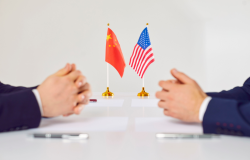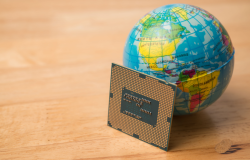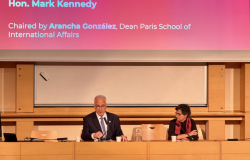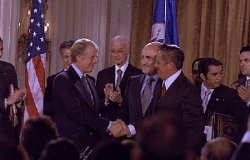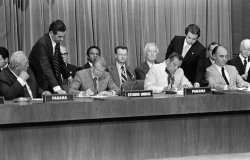What Does the World Expect of President-elect Trump: Middle East
Iran Expects:
Hassan Rouhani and his supporters worry whether the nuclear deal will hold and if it does not, will want to ensure they are not blamed; Iran’s Revolutionary Guard Corps (IRGC) likely to test Trump Administration early in the Persian Gulf.
Syrian Opposition, Arabs, and Kurds Expect:
With regard to the ongoing war in Syria, there is renewed concern that U.S. assistance to Anti-Assad opposition will end; and Trump Administratioin will be even more risk averse than predecessor.
Iraq Expects:
In the wake of the Mosul and Raqqa offensives, the Abadi Government is concerned about the willingness of the new administration to help with conflict stabilization and to continue a U.S. force presence in Iraq.
Israel Expects:
Prime Minister Netanyahu is expecting a better relationship with a Trump Administration and more room to maneuver with less pressure on the Palestinian issue and Iran; but worried that Trump’s green light on settlements may embolden his right wing..
Q: What challenges confront President-elect Trump?
A: Unlike every other region of the world the next President will confront a Middle East undergoing a volatile and violent transformation and transition to a destination yet unknown and undefined.
Seven realities define the new landscape: first, fragmenting and failing Arab states, especially in Syria, Libya, Yemen, and Iraq, riven by a witches’ brew of sectarian, ethic and regional divisions that have challenged fundamentally the very essence of Arab state authority; second, Salafi/Jihadists groups, such as al-Qaeda and Fatah al-Sham (formerly al-Nusra) that are feeding on sectarian hatreds, bad or no governance in order to gain sanctuary; challenge domestic order, inspire and direct terrorist attacks in the region and abroad; third, Russia’s effort to project its military and political power in the region with a view toward blocking US objectives and gaining position as a co-equal power, especially in Syria; four, a rising Iran which while implementing its nuclear agreement with the P5 plus 1 is bent on expanding its influence in Syria; Iraq; Yemen and in the Gulf; and fifth, serious strains with traditional US allies: Egypt (over human rights); Israel (over settlements) and Saudi Arabia (over Iran and Syria).
Q: What does the region expect from the new President?
President Trump will face an excruciatingly difficult task juggling, let alone meeting the conflicting expectations of allies and adversaries alike. A virtual unknown to most, there will be great uncertainty as to which direction the new President will move. His statements on the campaign trail have confused; worried and also pleased key parties. But the main issue on which much of this will turn is that of U.S. leadership. Will a Trump Administration be as risk averse or even more cautious than its predecessor? Here’s a sampling of expectations a number of parties may hold.
Iran: Radicals will rejoice; the Rouhani crowd will worry whether the nuclear deal will hold and how to ensure that if it ends, they won’t be blamed; May be an early test of Trump by Iran’s Revolutionary Guard Corps (IRGC)in the Gulf.
The Iraqi Government: Can the Abadi Government count on the Trump Administration in the wake of the Mosul and Raqqa offensives to help with conflict stabilization and will there continue to be a U.S. force presence in Iraq? Tensions with Iran will be bad for Abadi and stability in Iraq.
Egypt: The Sisi Government will welcome shift from focus on human rights; reform to more laissez faire approach and support for strong leadership;
Syrian Opposition, Arabs and Kurds: Worry that U.S. assistance to anti-Assad opposition will dry up.
Saudi Arabia: Will a Trump Administration toughen its policies toward Iran or be even more risk averse in Syria and continue to support the Saudi air campaign in Yemen? And what about the free rider issue?
Israel: Prime Minister Netanyahu is expecting a better relationship with a Trump Administration and less pressure on the Palestinian issue and Iran. But there are several yellow lights: Tensions between Netanyahu and American Jews; Trump enabling those to the right of Netanyahu. Tension between two willful, suspicious persona.
Q: What Should the Next President not do?
A: Acting is important but so often is not acting. Here are the top three not-to-dos for the next President:
First, avoid saying anything publicly that you don’t mean. Words do matter, particularly presidents’ words. Credibility is in essence believability—that allies and adversaries believe what America says because it acts on its words.
Second, do not go chasing shiny objects that appear to offer a means to increase American leverage and power without thinking through the consequences. Ideas that are untethered from well- developed strategies can be very risky. A case in point is the infatuation with No Fly Zones and safe zones in Syria.
Third, do not get swept up in the cause of democratic evangelism for which the Middle East is neither ready, nor terribly accepting. America’s interests and its values are almost never in perfect alignment—and because of the flexibility required to safeguard its interests, will probably never be.
Guest

Hosted By

Middle East Program
The Wilson Center’s Middle East Program serves as a crucial resource for the policymaking community and beyond, providing analyses and research that helps inform US foreign policymaking, stimulates public debate, and expands knowledge about issues in the wider Middle East and North Africa (MENA) region. Read more




